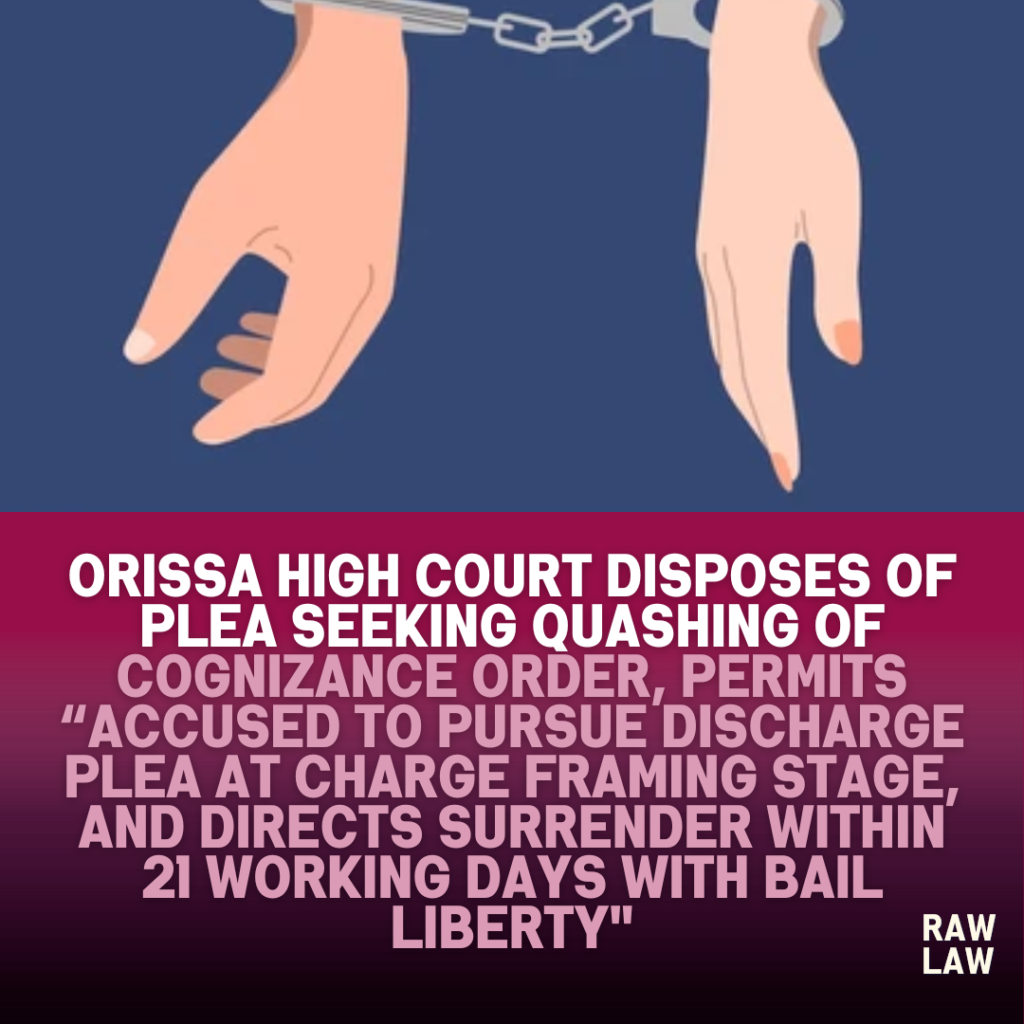Court’s Decision
The Orissa High Court disposed of a petition under Section 528 of the Bharatiya Nagarik Suraksha Sanhita, 2023 seeking to quash the cognizance order dated 19.03.2025 passed by the Judicial Magistrate First Class, Konark. Upon the petitioner’s statement that he did not wish to press the application, the Court dismissed the petition as not pressed, granting liberty to the petitioner to raise all contentions at the stage of framing of charge through a discharge petition.
The Court further directed the petitioner to surrender before the concerned Magistrate within 21 working days and move for bail. It directed that the Magistrate shall consider the bail plea in the first hour strictly on the materials available on record. In the event of rejection, the petitioner was permitted to approach the higher forum the same day, with a direction to the higher forum to decide the bail plea on the same day, applying the principle of parity if applicable.
Facts
The petitioner had approached the High Court under Section 528 of the Bharatiya Nagarik Suraksha Sanhita, 2023, seeking quashing of the cognizance order dated 19.03.2025 passed by the Judicial Magistrate First Class, Konark, in a criminal case registered as G.R. Case No. 417 of 2017. The alleged offences include Sections 341, 294, 332, 333, 353, 307, 186, 506, and 379 read with Section 34 of the Indian Penal Code.
Issues
Whether the order taking cognizance dated 19.03.2025 by the Magistrate in G.R. Case No. 417 of 2017 could be quashed in exercise of the Court’s power under Section 528 of the BNSS, 2023.
Petitioner’s Arguments
During the course of arguments, the petitioner’s counsel submitted that the petitioner did not want to press the application for quashing the cognizance order. However, he sought liberty for the petitioner to raise all grounds at the time of framing of charge by filing a discharge petition. He further requested that the petitioner be permitted to surrender and move for bail.
Respondent’s Arguments
The order does not record any detailed counter-argument from the State’s counsel as the application was not pressed and the matter was disposed of on consent.
Analysis of the Law
The Court proceeded under Section 528 of the Bharatiya Nagarik Suraksha Sanhita, 2023, which deals with inherent powers of the High Court analogous to Section 482 of the CrPC. In exercising discretion, the Court took note of the petitioner’s intent not to press the petition and instead seek discharge before the trial court. The Court also ensured procedural fairness by granting directions regarding surrender and expeditious consideration of bail on merits.
Precedent Analysis
The judgment does not cite any specific judicial precedents, but the manner in which the Court structured the surrender and bail directions reflects consistent judicial practice in balancing the rights of the accused with the necessity of appearance before the trial court.
Court’s Reasoning
The Court found that since the petitioner was not pressing the petition, no adjudication on merits was required. However, recognising the petitioner’s right to raise contentions at the framing of charge stage and the need to ensure procedural compliance, the Court directed surrender and permitted a bail application. The direction to consider the bail plea “in the first hour” and dispose of the matter “on the same day” if moved before the higher forum indicates a conscious attempt by the Court to ensure timely access to justice.
Conclusion
The Orissa High Court dismissed the quashing petition as not pressed but protected the petitioner’s rights by granting liberty to file a discharge plea and obtain bail through time-bound directions. The Court’s directions balance judicial efficiency with individual liberty, providing a structured framework for further proceedings.
Implications
The order reiterates the High Court’s approach of not interfering at the cognizance stage when alternative remedies like discharge under BNSS/CrPC exist. It underscores the importance of surrender and timely bail procedures, especially in cases involving serious charges. Trial courts are reminded to process bail applications expeditiously and higher forums are directed to act promptly if approached.
Judgments Referred
None cited explicitly in this order.
FAQs
1. Can an accused withdraw a petition seeking quashing of cognizance and opt for discharge instead?
Yes, the High Court can permit withdrawal and grant liberty to the accused to seek discharge at the charge framing stage.
2. What is the timeline within which an accused must surrender as per this order?
The Court directed the accused to surrender within 21 working days before the Magistrate.
3. What happens if bail is denied by the Magistrate?
The accused may approach the higher forum on the same day, and the higher court is directed to decide the bail plea promptly, maintaining parity principles if applicable.
